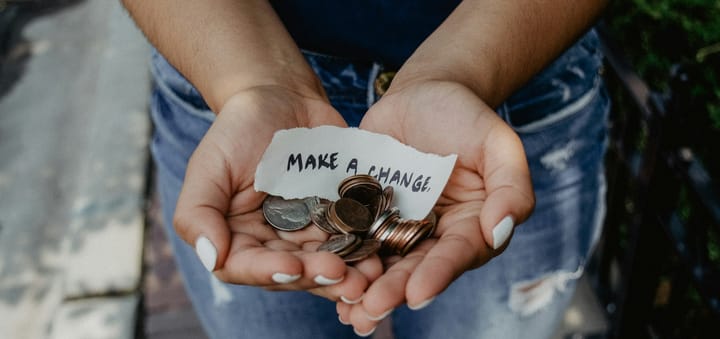Books That Will Actually Make You Financially Smarter (Not Just Feel Smart About Money)
Skip the generic money advice. These books actually changed how I think about and handle money - battle-tested by someone who made plenty of financial mistakes first.
Tired of financial advice that sounds like it was written by robots for people who live in spreadsheets?
I see you drowning in generic money tips that assume you have a trust fund, zero emotions about spending, and the organizational skills of a CFO. "Just invest 20% of your income!" they say, while you're calculating whether you can afford both groceries AND gas this week.
Most financial books fall into two useless categories: intimidating textbooks that make you feel stupid or oversimplified fluff that treats you like a financial toddler. Neither actually helps you make better money decisions in the real world.
Here's what I learned after reading dozens of money books (and making expensive mistakes with half their advice): The best financial books don't just teach you about money - they change how you think about it.
Battle-tested by someone who went from financially clueless to confidently handling money without becoming a spreadsheet obsessive or giving up coffee.
Why Most Financial Books Fail
They assume you're already organized. Most money advice requires systems you don't have and habits you've never built.
They ignore the emotional side of money. Spending decisions aren't logical - they're psychological.
They're written by people who were always good with money. Try finding advice from someone who actually struggled first.
They focus on extreme scenarios. Either you're broke or you're optimizing your seventh investment account.
They make everything sound complicated. The financial industry profits from complexity, not clarity.
The solution: Books that meet you where you are and give you frameworks that work for real humans with real emotions about money.
💰 Books That Changed How I Think About Money
"Your Money or Your Life" by Vicki Robin
Why it's different: This isn't about budgeting - it's about understanding what money actually represents in your life.
The game-changing concept: Money is your life energy. Every dollar you spend equals time you traded to earn it.
What actually stuck:
- The real hourly wage calculation - Factor in commute, work clothes, stress meals, and suddenly that $25/hour job becomes $15/hour
- The crossover point - When your passive income covers your expenses (retirement, but explained in human terms)
- Enough vs. more - Distinguishing between fulfillment and consumption
Real-world application: I started asking "Is this worth X hours of my life?" before purchases. Completely changed my spending patterns.
Who it's for: People who feel like they're trading their life for money but don't know how to change the equation.
"The Behavior Gap" by Carl Richards
Why it's different: Finally, someone who admits that smart people make dumb money decisions.
The core insight: The gap between what we should do with money and what we actually do is where financial disaster lives.
What actually helped:
- Behavior beats knowledge - Knowing about compound interest doesn't help if you panic-sell during market dips
- Simple beats complex - Complicated financial strategies fail because life gets in the way
- Mistakes are data - Every financial screw-up teaches you something about your money psychology
Best practical tool: The one-page financial plan. Write down what you're trying to accomplish and why. Everything else is just tactics.
Who it's for: People who know what they should do with money but keep sabotaging themselves anyway.
"I Will Teach You to Be Rich" by Ramit Sethi
Why it actually works: No shame, no penny-pinching, just systems that automate good financial behavior.
The refreshing approach: Optimize the big wins, ignore the small stuff. Skip the latte guilt.
Systems that actually stuck:
- Automatic everything - Bills, savings, investments happen without willpower
- The conscious spending plan - Budget for stuff you love, ruthlessly cut stuff you don't
- Negotiation scripts - Actual words to use when calling credit card companies, asking for raises
Unexpected insight: Rich people optimize differently than broke people. Rich people focus on earning more, broke people focus on spending less.
Who it's for: People who want to be good with money without becoming obsessed with money.
"The Millionaire Next Door" by Thomas Stanley
Why it matters: Destroys every assumption about what wealthy people actually look like.
The reality check: Most millionaires drive used cars, live in modest homes, and shop at regular stores.
What changed my perspective:
- Income vs. wealth - High earners who spend everything aren't wealthy
- Stealth wealth - The flashy lifestyle you think you want might be keeping you broke
- Business ownership - Most wealthy people own businesses, not because they're entrepreneurs but because it's how you build equity
Practical takeaway: Wealth is what you keep, not what you make. Changed how I think about lifestyle inflation.
Who it's for: People who think they need to look rich to be rich (spoiler: it's usually the opposite).
"The Simple Path to Wealth" by JL Collins
Why it cuts through the noise: Investment advice without the financial industry complexity.
The beautiful simplicity: Buy index funds, invest consistently, don't panic during downturns. That's it.
What made investing less scary:
- Index funds explained like humans - You're buying tiny pieces of the entire market
- Market crashes are sales - When prices drop, you're buying more shares for the same money
- Time beats timing - Consistent investing wins over trying to time the market
Best reality check: "The market always recovers, but you have to stay in the game for that to matter."
Who it's for: People who want to invest but feel overwhelmed by all the options and opinions.
💡 Books for Specific Money Challenges
For Business Owners: "Profit First" by Mike Michalowicz
The problem it solves: Business owners who make money but never keep it.
The counterintuitive system: Take profit first, then figure out how to run the business on what's left.
Why it works: Forces you to build a profitable business instead of just a busy one.
For Overspenders: "Happy Money" by Ken Honda
What it addresses: The emotional relationship with money that drives spending decisions.
Key insight: Money carries energy - how you feel about it affects how you handle it.
Practical impact: Helped me understand why I made certain financial decisions and how to change the patterns.
For Debt Freedom: "The Total Money Makeover" by Dave Ramsey
What it does well: Clear, step-by-step plan for getting out of debt.
The debt snowball method: Pay minimums on everything, attack smallest debt first for psychological wins.
Why it works: Treats debt elimination like the emotional journey it actually is, not just a math problem.
For Side Hustlers: "The $100 Startup" by Chris Guillebeau
The focus: Starting profitable businesses without massive investment.
What I learned: Most successful businesses start small and grow, rather than requiring huge upfront investment.
Practical value: Case studies of real people building income streams, not theoretical business plans.
🚫 Financial Books That Disappointed Me (So You Don't Waste Time)
"Rich Dad Poor Dad" - Inspiring but light on actionable advice. Great for mindset, terrible for specifics.
"The 4-Hour Workweek" - Lifestyle porn that doesn't work for most people's actual lives.
Most day trading books - Written by people selling courses, not people who actually made money trading.
Generic budgeting books - If you needed a 300-page book to understand "spend less than you earn," you have bigger problems.
📚 How to Actually Learn from Financial Books
Start with Your Specific Problem
Debt: Start with Dave Ramsey for the system, then "The Behavior Gap" for the psychology
Investing: "Simple Path to Wealth" first, then branch out based on your situation
Business: "Profit First" if you own one, "The $100 Startup" if you want to
Spending: "I Will Teach You to Be Rich" for systems, "Happy Money" for psychology
Read Actively, Not Passively
Take notes while reading - What applies to your situation right now?
Implement one thing at a time - Don't try to overhaul your entire financial life
Track what works - Keep a simple log of what changes actually improve your situation
Question Everything
Does this advice fit your life? High-earning advice doesn't work for low incomes
Is this person selling something? Be skeptical of books that lead to expensive courses
What's their actual track record? Theory is different from proven results
🎯 The PickyFox Financial Reading Strategy
Phase 1: Foundation (Pick 1-2)
- "Your Money or Your Life" for philosophy
- "I Will Teach You to Be Rich" for systems
Phase 2: Psychology (Pick 1)
- "The Behavior Gap" if you self-sabotage
- "Happy Money" if emotions drive your spending
Phase 3: Specific Goals (Pick based on need)
- Investing: "Simple Path to Wealth"
- Debt: "Total Money Makeover"
- Business: "Profit First" or "$100 Startup"
Phase 4: Advanced (Only after mastering basics)
- "The Millionaire Next Door" for wealth-building mindset
- Specific investment or business books based on your chosen path
🔄 Putting Book Knowledge into Practice
The One-Change Rule
Read the entire book, then implement exactly one change. Master that before adding complexity.
Examples:
- Automate one bill payment
- Start investing $50/month
- Track spending for one category
- Negotiate one recurring expense
The 30-Day Test
Try each author's main recommendation for 30 days. Some advice sounds good but doesn't fit your life.
Document what happens:
- Did it actually save money?
- Was it sustainable with your schedule?
- How did it affect your stress level?
The Reality Check
Financial advice that doesn't account for your actual life is worthless.
Good advice works even when:
- You're tired and don't want to think
- Life throws you unexpected expenses
- You're not perfectly organized
- You have emotions about money
The Uncomfortable Truth About Financial Books
Reading about money won't make you rich. Taking action on what you read might.
Most people read financial books like entertainment. They feel productive without actually changing anything.
The best financial book is the one you actually implement, not the one with the most clever insights.
Your relationship with money is personal. What works for the author might not work for you, and that's okay.
Start where you are, not where you think you should be. The perfect financial plan you don't follow is worthless.
Ready to actually change your financial situation instead of just reading about it? Pick one book from the foundation list, read it completely, then implement one specific change for 30 days. Get in touch with your results - I love hearing about financial transformations that stick.
Want more practical money strategies? Check out our budget tools that make money management fun or explore life systems that save time and money.


